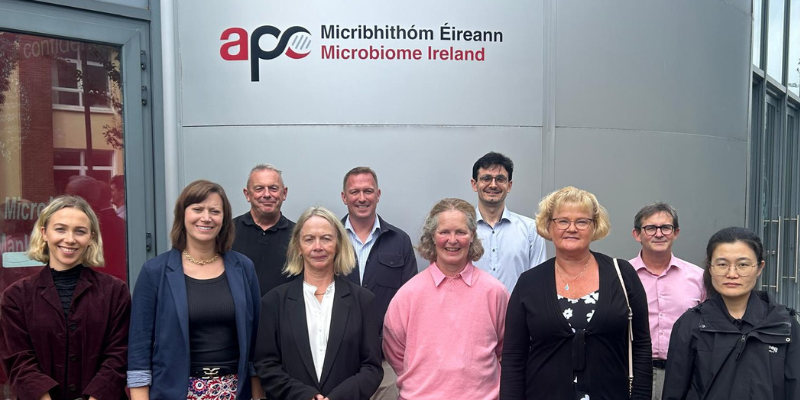A groundbreaking study on the gut health of newborn babies delivered by Caesarean section has been extended by four years, following promising developments.
The Missing Microbes in Infants born by C-section study (MiMIC) investigates the gut bacteria that are missing or depleted in infants born by C-section, or who have been exposed to antibiotics, with the aim of developing microbiome-based solutions to benefit infant health and development.
MiMIC is a partnership between APC Microbiome Ireland (APC), a world-leading Research Ireland centre at University College Cork (UCC), the Agriculture and Food Development Authority Teagasc, and IFF, a global leader in flavours, fragrances, food ingredients, and health & biosciences products.
The MiMIC project, which began in 2017, has already recruited 500 mother-infant pairs. Led by APC researchers Prof Catherine Stanton (Teagasc) and Prof Paul Ross (UCC), as well as Prof Eugene Dempsey, consultant neonatologist at Cork University Maternity Hospital and researcher with the INFANT Research Centre based at UCC, the study investigates the effects of maternal antibiotics during pregnancy and birth mode (C-section vs vaginal birth) on the infant gut microbiota over the first two years of life. In particular, the study aims to identify microbial populations that are missing in infants born by C-section, whose gut microbiota is often altered by these early-life factors.
The MiMIC Follow-Up study will continue to observe this cohort of children, now extending the analysis to age five years, and will incorporate 400 children from the original MiMIC cohort. In addition, participants from a separate APC study entitled PIMENTO (Preterm Infants: Microbiome Establishment, Neuro-CrossTalk and Origins) will be added to the follow-up study. This continued work will focus on several key aims:
- Long-Term Observations: Further investigation into the neurological development, immune health, and metabolic health of the MiMIC cohort at 5 years of age. This data will provide valuable insights into the longer-term effects of early microbiome disruptions on health outcomes.
- Expanded Biosampling: Additional sample collection followed by advanced sequencing and bioinformatics analysis to complete the analysis of microbiome development.
- Environmental Factors and Brain Programming: Advanced statistical and bioinformatics techniques will be employed to identify modifiable environmental factors that impact specific bacterial groups and consortia involved in immune and brain development. These findings will enhance our understanding of how the microbiome shapes cognitive and immune function.
- Characterising Missing Microbes: The study will continue the characterization of microbes in the MSB (MiMIC Strain Bank) biobank, focusing on ‘gold standard’ babies—those born vaginally without antibiotic intervention—. This research aims to identify and isolate the missing microbes in infants born by C-section and/or exposed to antibiotics.
The continued success of the MiMIC study highlights the growing importance of microbiome research in early childhood development. The team at APC and IFF are committed to understanding how the gut microbiota plays a role in long-term health outcomes, particularly in the context of birth mode and antibiotic use, and to generate actionable insights and strategies to improve outcomes for future generations.
“We are thrilled to extend this critical collaboration with IFF, building upon the findings of MiMIC to date and expanding the scope of our research,” said Professor Paul Ross, Director of APC Microbiome Ireland. “The MiMIC Follow-Up study will provide further insights into the long-lasting effects of early-life microbiome disruptions, which could have profound implications for public health policy and clinical practices.”
“APC and the MIMIC team are delighted to be embarking on this second phase of the project in partnership with IFF. This critical phase will see the infants reach 5 years old as we chart the relationship between early life microbiota, and specifically missing microorganisms as a result of C-section and antibiotics, on a range of health outcomes from atopic disease to neurocognitive development,” said Prof Catherine Stanton, a UCC Research Professor and Senior Principal Research Officer at Teagasc.
“The microbiome plays a crucial role in infant health and development, but until recently, the impact of C-section delivery and antibiotic exposure on the gut has been relatively unknown,” said Dr Johanna Maukonen, Global Director of Clinical Innovation and Translation at IFF. “Preliminary results from the initial research on infants up to 2 years have been promising, and we’ve made important progress in identifying potentially missing microbes for this age group. As this groundbreaking study with the APC moves into its next phase with children up to 5 years, it promises to unlock new opportunities for intervention, ensuring every child has the best start in life.”
Photo caption: L-R: Fiona Ross – APC Researcher at UCC, Dr Ashley Hibbert – Human Microbiomics Platform Lead at IFF, Prof Paul Ross – Director at APC at UCC, Prof Catherine Stanton – Senior Principal Research Officer at Teagasc Moorepark, Dr. Charles Budinoff – Strain Discovery and Microbiome Science Lead at IFF, Carol Ann O’Shea – APC Nurse at UCC, Dara Hedayatpour – APC Researcher at UCC, Dr Johanna Maukonen – Global Director of Clinical Innovation & Translation at IFF, Prof Eugene Dempsey – Principal Investigator at The Infant Centre, UCC, Funded Investigator at APC, Consultant Neonatologist at CUMH, Dr. Mengfan Ding – APC Researcher at UCC.
